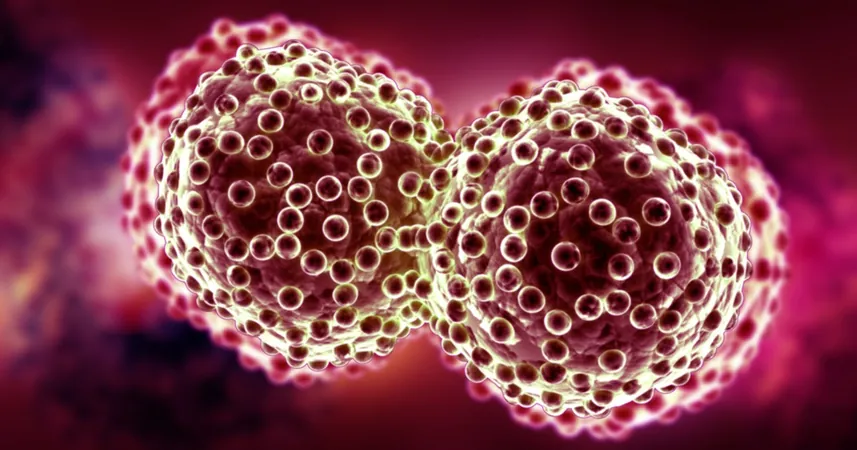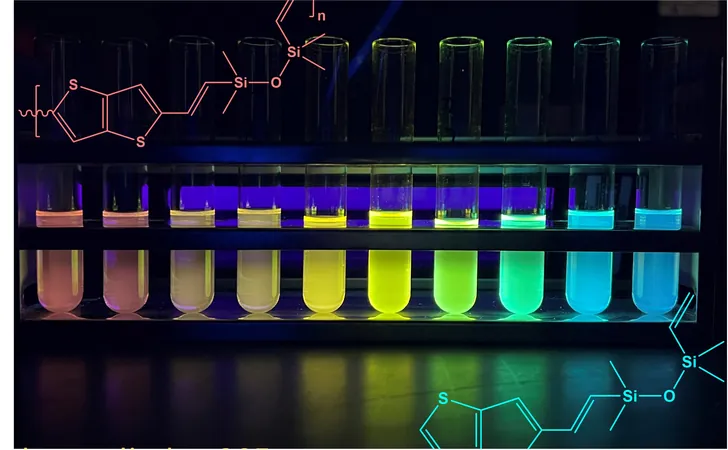
Scientists Unlock the Secrets: Why Some Cells Are More Prone to Cancer Than Others!
2025-05-03
Author: Charlotte
Revolutionary Discovery in Cell Division and Cancer Risk
A groundbreaking study from Sinai Health in Toronto has uncovered a surprising reason why some mutated cells spiral into cancer while others manage to stay healthy: the speed at which they divide! This revelation could reshape our understanding of cancer development.
The Science Behind Cell Behavior
Researchers have introduced the concept of 'total cell cycle duration' (Tc), the total time a cell takes to complete one division. Their findings indicate a shocking trend—cells that divide rapidly are far more likely to become cancerous compared to their slower counterparts.
Mutation Alone Isn't Enough
Every day, our bodies accumulate mutations through environmental factors, inherited traits, or random cellular errors. Yet, most mutated cells do not turn cancerous. Dr. Rod Bremner, a senior investigator at Sinai Health, explains, "An average adult has millions of mutated cells, but we don’t develop cancer every day—this begs the question: Why?"
The Rb Gene and Tumor Resistance
The research team delved into retinoblastoma, a rare childhood eye cancer, investigating cells with mutations in the Rb gene—a crucial tumor suppressor. Astonishingly, mice with the Rb mutation did not develop tumors in most tissues, raising a critical question: What differentiates cancer-susceptible cells from those that resist?
Dividing Cells: The Fast and the Cancerous
Delving deeper, Dr. Bremner and his team examined how quickly cells divided after mutations occurred. Strikingly, they found that cancers emerged from the cell types with the shortest cell cycle times. Fast-dividing cells were almost invariably the ones that succumbed to cancer.
Slowing Down the Race Against Cancer
This vital research indicates that extending the cell cycle time can prevent tumor formation. Even when traditional defenses against cancer, like immune responses or programmed cell death, did not activate, simply slowing down division proved effective at keeping cancer at bay.
Normal Cells: The Undiscovered Heroes
The study dismantles the theory that only cell death or immune surveillance prevents cancer. Many mutated cells revert to normal functions by ceasing abnormal divisions. "The most common way mutated cells evade cancer is by acting like normal cells," says Dr. Bremner.
Rethinking Cancer's Impact
Traditionally, cancer has been defined by traits like uncontrolled growth and evasion of death. This new perspective highlights the need to include total cell cycle duration as a critical characteristic of cancerous cells. It’s not only about the genetic makeup but also how quickly those cells divide.
A New Dawn for Cancer Prevention?
This research opens pathways for innovative cancer prevention strategies. Slowing down cell division could become a revolutionary treatment approach. Dr. Bremner suggests, "If we can slow down cancer-prone cells with appropriate therapeutic agents, we may prevent tumors before they form." This breakthrough not only urges a re-evaluation of cancer research but also hints at future therapies that could enhance our bodies’ natural resilience against cancer, merely by giving cells a little more time to divide safely!
The Future of Cancer Research Looks Promising
With much still to explore, this study offers a fresh perspective on cancer, emphasizing the importance of timing alongside genetics. The race against cancer might just hinge on understanding how quickly our cells choose to multiply!









 Brasil (PT)
Brasil (PT)
 Canada (EN)
Canada (EN)
 Chile (ES)
Chile (ES)
 Česko (CS)
Česko (CS)
 대한민국 (KO)
대한민국 (KO)
 España (ES)
España (ES)
 France (FR)
France (FR)
 Hong Kong (EN)
Hong Kong (EN)
 Italia (IT)
Italia (IT)
 日本 (JA)
日本 (JA)
 Magyarország (HU)
Magyarország (HU)
 Norge (NO)
Norge (NO)
 Polska (PL)
Polska (PL)
 Schweiz (DE)
Schweiz (DE)
 Singapore (EN)
Singapore (EN)
 Sverige (SV)
Sverige (SV)
 Suomi (FI)
Suomi (FI)
 Türkiye (TR)
Türkiye (TR)
 الإمارات العربية المتحدة (AR)
الإمارات العربية المتحدة (AR)